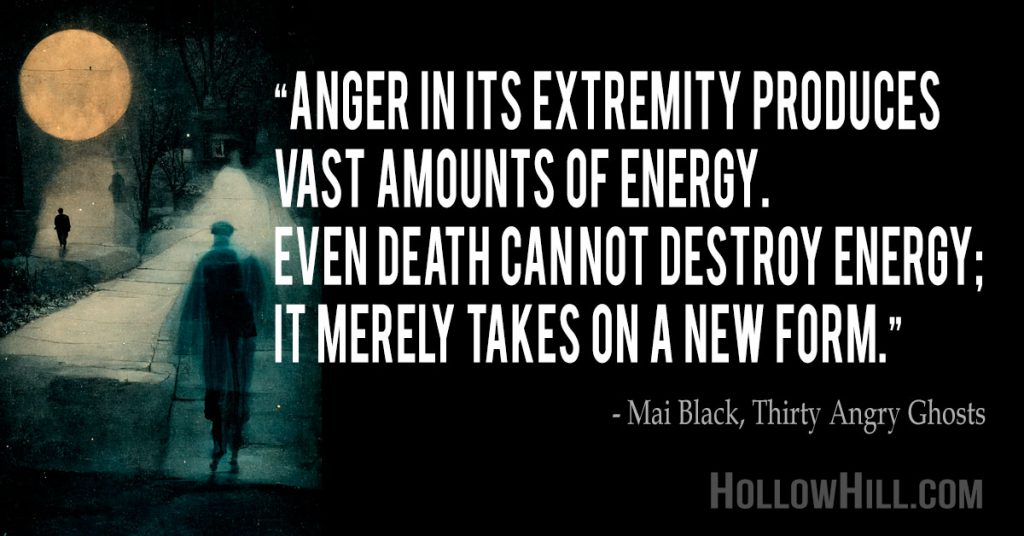As an Amazon Associate I earn from qualifying purchases. Click for details.
How do ghost hunters explain angry ghosts, and when intense hauntings go far past “residual energy”? And what can we do about it, during investigations?
The topic of residual energy hauntings isn’t new, but when researcher Chris Williams referenced them at my Facebook Page – I thought he made a good point.
In a discussion about whether (or perhaps when/how) ghosts can hurt you, he referenced one type of haunting that can seem – at times – benign.
If you think your home – or any haunted site – has residual, ghostly energy, here’s what to do…
BUT what can you do, “… if you stumble upon a residual haunting and force contact and disrupt the spirits’ routine”?
Well, forcing contact with a ghost is NEVER a good idea.
But that got me thinking about the power of emotional energy, especially when it’s highly focused… and angry.

If you’ve ever witnessed someone – a living person – who’s in a rage and venting, you’ve seen the kind of anger I’m thinking about.
From my viewpoint, some compulsive actions and activities have a similar energy, as do highly focused activities. (Consider how ferociously some people focus during gym workouts. It can look a lot like anger.)
As Albert Einstein said:
“Energy cannot be created or destroyed;
it can only be changed from one form to another.”
Many ghosts seem angry, especially when confronted. So, that raises a question:
When someone is angry at the time they pass, where does the angry energy go?
In fact, where does human energy of all kinds go… the love, the hate, the exhilaration, the passion, the delight?
Is it always lingering as residual energy, just waiting for a trigger to become obvious to others?
Of course, those are rhetorical questions. We don’t know the answers, yet.
But, getting back to angry ghosts…
Most ghost stories seem connected to anger.
For example:
- Anger at a person, or even anger at an entire family or community. The “vengeful spirit” trope is especially popular in ghost stories.
- Anger about circumstances, such as poverty and plagues. (Ghost Adventures explored at least one such haunting.)
- Anger about outcomes and disappointments. For example, the many ghost stories related to brides – such as Alexandria’s Burning Bride.
- Anger about moral issues and political causes, resulting in haunted battlefields. (Gettysburg is a classic, but Lexington Green’s grisly history is often overlooked.)
Then there’s the practice of “provoking” ghosts by deliberately antagonizing them and making them angry. (A misguided and cruel practice, in my opinion, and rarely necessary.)
I think Chris has a valid point, about the danger of interrupting a spirit’s routine.
Perhaps this needs further investigation.
For example, is the repeated ghostly activity – typical of what we call “residual energy” – part of how the ghost is processing his/her/their death, albeit slowly?
And, if a ghost can practically embed itself – and its energy – in a physical location, are we more at risk if we push, prod, and provoke that ghost, distracting the spirit from something he/she/they feel is necessary?
If the spirit’s routines are interrupted, should we be surprised if the ghost retaliates in threatening ways?
Anger may be an essential but overlooked element in some hauntings. It may have been lingering there, all along.
(I’m reminded of those unfortunate TV ads for Kayak dot com, where someone flies into a rage over the mere mention of the travel service.)
Perhaps we should consider the emotional energy of a likely ghost (or ghosts) – or the energy apparently embedded in the haunted location – as we plan our investigations.
That’s especially true when you’re planning a visit to a site that’s known to be intensely haunted.
The “intense” part suggests the energy at that site could be more than you’d expected.
For every ghost hunt, it’s wise to decide ahead of time what might anger the ghosts.
Consider what precautions – and protections – could keep you safe.
I hope you never encounter a terrifying, angry ghost. But if you’ve had that kind of experience, please leave a comment! Share your story, so others can learn from your experiences.
